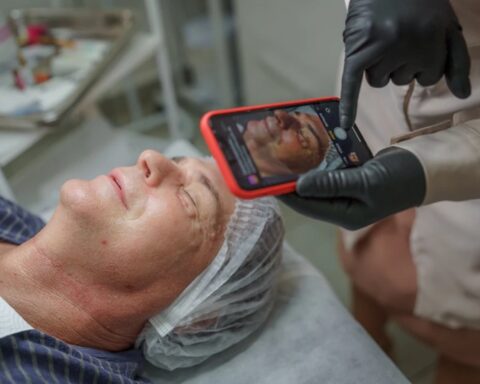What’s your most frequent nightmare? Is it dreaming that you’re dying, or that one of your loved ones is suffering but you can’t do anything about it? Or maybe you’re waking up with confusion and a racing heart, simply glad that the dream ended.
Nightmares are a core symptom of Post-traumatic stress disorder (PTSD), probably because the difficulty with traumatic events lies in people’s inability to process them, says Neil Greenberg, professor of defense mental health at King’s College London.
“So what happens is that their mind unconsciously tries to play around with them, tries to make sense of them,” Greenberg explained.
This results in “the unconscious bit of the brain, which may come to the front of the mind when someone is asleep,” including material from the traumatic event that may come out as a nightmare.
Not all nightmares are indicative of a mental health problem, Greenberg warns. People have to look not just at their nightmares but at other symptoms, “which make up together the recipe of a particular mental health problem.”
So, these night terrors could be trying to warn you about your health.
Lupus
“Horrific… murders… skin coming off people…” That’s how one patient with lupus described the nightmares associated with the autoimmune disease.
Lupus affects at least 50,000 Indians and sees the body’s own immune system attack itself, causing joint pain, skin rashes and fatigue. But a study by the University of Cambridge and King’s College London found that nightmares – often involving being attacked, trapped or crushed – were often a symptom of a flare up, with many citing them as starting before diagnosis and three out of five patients reporting regular bad dreams continuing throughout their illness.
What to do: See your doctor if you think you have symptoms of lupus. They can order blood tests to check for the disease and prescribe medication to control it.
Sleep apnoea
104 million of us suffer from sleep apnoea, where breathing stops temporarily during sleep as the airways become obstructed and many don’t know they have it. It can be linked to conditions such as depression, heart disease and an increased risk of stroke, but studies have shown it can trigger nightmares too.
Researchers at Swansea University found thatsufferers with severe symptoms often reported “emotionally negative and unpleasant” nightmares. One treatment involves wearing a CPAP (continuous positive airway pressure) mask in bed, which delivers air to you while asleep and it was found that nine out of 10 users stopped having nightmares.
What to do: Making noises while you sleep and feeling very tired in the daytime can be a sign you have sleep apnoea. See your doctor for diagnosis. Lifestyle changes like losing weight can help.
Migraine
Bad dreams have also been associated with some people suffering migraine attacks. The severe headaches can cause throbbing pain on one side of the head, feeling dizzy and a warning aura involving sight problems that can last from two hours to three days.
According to a study reported in the journal Psychotherapy and Psychosomatics, the extreme headaches can sometimes be preceded by dreams involving things like misfortune.
What to do: See your doctor if you are getting regular symptoms. They can prescribe painkillers and other medicines to help.
Heart problems
Nightmares have been linked to an irregular heartbeat, known as arrhythmia. Symptoms include palpitations, feeling dizzy and shortness of breath. Some pose little health risk while others could reveal a serious problem. But a study published in the Netherlands Journal of Medicine found that people who had bad dreams were three times more likely to suffer from an irregular heartbeat and also more likely to get chest pain.
Experts think that these nightmares may be related to breathing problems lowering oxygen levels in the brain.
What to do: See your doctor, who can order tests and referrals to diagnose the cause of the irregular beats and refer you to a specialist.
Parkinson’s disease
People with Parkinson’s disease are four times more likely to experience regular nightmares. These can often involve being chased or attacked and see sufferers lash out with their limbs in bed.
There are 7 million people living with the condition in India, which causes parts of the sufferer’s brain which regulates movement to become damaged. Symptoms include stiff muscles, slow movement and tremors.
A study by scientists at the University of Birmingham found that people who had “distressing dreams” once or more a week were more likely to receive a Parkinson’s disease diagnosis in the coming years.
What to do: See a doctor if you have symptoms, which can start as early as your 40s. There’s no cure, but there are treatments to help manage the disease once it’s diagnosed.
Courtsey:- Nina Avramova, CNN and James Moore, Amy Packer, Daily Express





